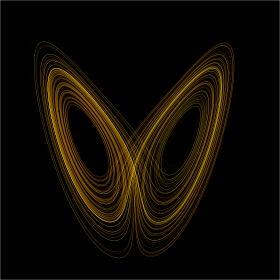The systems science portal
 |
| Complex systems approach |
Systems science is an transdisciplinary[1] field that studies the nature of systems—from simple to complex—in nature, society, cognition, engineering, technology and science itself. To systems scientists, the world can be understood as a system of systems. The field aims to develop interdisciplinary foundations that are applicable in a variety of areas, such as psychology, biology, medicine, communication, business management, engineering, and social sciences.
Systems science covers formal sciences such as complex systems, cybernetics, dynamical systems theory, information theory, linguistics or systems theory. It has applications in the field of the natural and social sciences and engineering, such as control theory, operations research, social systems theory, systems biology, system dynamics, human factors, systems ecology, systems engineering and systems psychology. Themes commonly stressed in system science are (a) holistic view, (b) interaction between a system and its embedding environment, and (c) complex (often subtle) trajectories of dynamic behavior that sometimes are stable (and thus reinforcing), while at various 'boundary conditions' can become wildly unstable (and thus destructive). Concerns about Earth-scale biosphere/geosphere dynamics is an example of the nature of problems to which systems science seeks to contribute meaningful insights.
Selected article -
An operating system (OS) is system software that manages computer hardware and software resources, and provides common services for computer programs.
Time-sharing operating systems schedule tasks for efficient use of the system and may also include accounting software for cost allocation of processor time, mass storage, peripherals, and other resources. (Full article...)
Selected picture

The Lorenz attractor is a 3-dimensional structure corresponding to the long-term behavior of a chaotic flow, noted for its butterfly shape. The map shows how the state of a dynamical system (the three variables of a three-dimensional system) evolves over time in a complex, non-repeating pattern.
The attractor itself, and the equations from which it is derived, were introduced by Edward Lorenz in 1963, who derived it from the simplified equations of convection rolls arising in the equations of the atmosphere.
'WikiProjects
Selected biography -
Gerard de Zeeuw (born 11 March 1936) is a Dutch scientist and Emeritus professor Mathematical modelling of complex social systems at the University of Amsterdam in the Netherlands. He is known for his work on the theory and practice of action research, particularly on the "Problems of increasing competence", "Second order organisational research" and "Three phases of science: A methodological exploration". (Full article...)
Did you know
- ... * continuing vertically with a science of design,
- ... * and next a science of action, called "Interactive management".
- ... that the American ecologist Howard T. Odum in 1950 gave a novel definition of ecology as the study of large entities (ecosystems) at the "natural level of integration".
- ... that the anthropologist, linguist, and cyberneticist Gregory Bateson's most noted writings are Steps to an Ecology of Mind (1972) and Mind and Nature (1980).
Categories
Related portals
Topics
Tasks
 |
Here are some tasks awaiting attention:
|












